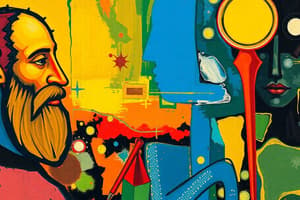Podcast
Questions and Answers
What is the philosophical movement that advocates reason and logic as the basis of authority?
What is the philosophical movement that advocates reason and logic as the basis of authority?
- Romanticism
- Postmodernism
- The Enlightenment (correct)
- The Scientific Revolution
What is the separation of church and state?
What is the separation of church and state?
Religious Sphere
What was a major influence of the US Bill of Rights?
What was a major influence of the US Bill of Rights?
Political Sphere
Enlightenment philosophers met to discuss _____, ____, and how to solve ______.
Enlightenment philosophers met to discuss _____, ____, and how to solve ______.
What method did they believe in using to solve social problems?
What method did they believe in using to solve social problems?
What were the underground clubs where philosophers met called?
What were the underground clubs where philosophers met called?
Who was known as 'The Sun King'?
Who was known as 'The Sun King'?
Where is the Palace of Versailles located?
Where is the Palace of Versailles located?
Who was Jean Jacques Rousseau?
Who was Jean Jacques Rousseau?
What did Rousseau believe about humans?
What did Rousseau believe about humans?
What social theory is associated with Rousseau?
What social theory is associated with Rousseau?
What is Hobbes' view of people?
What is Hobbes' view of people?
Who is associated with the notion of government needing to be checked?
Who is associated with the notion of government needing to be checked?
Montesquieu believed in three types of government: monarchies, republics, and _________.
Montesquieu believed in three types of government: monarchies, republics, and _________.
What did Montesquieu say about power in government?
What did Montesquieu say about power in government?
What are the three natural rights according to John Locke?
What are the three natural rights according to John Locke?
Who created the vaccine against smallpox?
Who created the vaccine against smallpox?
What event led to the Age of Enlightenment?
What event led to the Age of Enlightenment?
Who wrote the book 'Leviathan'?
Who wrote the book 'Leviathan'?
What is the social contract?
What is the social contract?
What are natural rights?
What are natural rights?
Locke's 3 aspects of natural rights are _____, _____, and ______.
Locke's 3 aspects of natural rights are _____, _____, and ______.
Who published 'The Spirit of Laws'?
Who published 'The Spirit of Laws'?
What was Voltaire known for?
What was Voltaire known for?
What is the title of the 28-volume set of books created by Diderot?
What is the title of the 28-volume set of books created by Diderot?
What economic policy did Physiocrats advocate?
What economic policy did Physiocrats advocate?
Who is Adam Smith?
Who is Adam Smith?
Flashcards are hidden until you start studying
Study Notes
The Enlightenment
- A philosophical movement originating in France advocating for reason and logic as the basis for authority and decision-making.
- Emphasized solving social problems through rational thought.
Separation of Church and State
- A principle highlighting the need for religious institutions to remain independent from government influence.
Political Influence
- The Enlightenment significantly impacted the US Bill of Rights, fostering ideas around individual freedoms and government limitations.
Philosophers and Discussions
- Enlightenment thinkers convened to explore topics centered on reason, logic, and the resolution of societal issues.
- These gatherings often happened in informal settings called salons.
Scientific Method
- Advocated as a systematic way to address social challenges, emphasizing observation and experimentation.
King Louis XIV
- Known as "The Sun King," his reign was characterized by the belief in the Divine Right of Kings, where sovereignty derived from divine will.
Palace of Versailles
- A grand palace located 12 miles outside Paris, constructed between 1681 and 1682 over a span of eleven years.
Jean-Jacques Rousseau
- A prominent Swiss philosopher (1712-1778) known for his work "Social Contract."
- Posited that humans are inherently good but corrupted by society, resulting in social competition and inequality.
Rousseau's Social Contract
- Argued that government should prioritize citizens' happiness and well-being, with the people as the ultimate source of governmental authority.
- Asserted the right to revolt against ineffective or oppressive leaders.
Thomas Hobbes
- Proposed that humans are born wicked and require a strong, absolute leader for social order.
- Denied the right of rebellion against authority.
Baron de Montesquieu
- French Enlightenment thinker (1689-1755) advocating for the separation of powers within government.
- Identified three forms of government: monarchies, republics, and despotisms.
Checks and Balances
- Emphasized the necessity of dividing government power among branches to prevent tyranny and safeguard individual freedoms.
John Locke
- British philosopher (1632-1704) who believed in natural rights: life, liberty, and property.
- Advocated the idea of the mind as a blank slate and emphasized human reason over inherent wickedness.
Edward Jenner
- Credited with creating the first vaccine against smallpox, contributing significantly to public health.
Scientific Revolution's Role
- The Age of Enlightenment was catalyzed by advancements during the Scientific Revolution, which prioritized empirical evidence and logic.
Thomas Hobbes' Leviathan
- Authored "Leviathan," where he outlined his views on absolute sovereignty and societal structuring.
Natural Rights Concept
- Defined as basic rights inherent to all individuals, encapsulated by Locke's triad of life, liberty, and property.
Montesquieu's Contributions
- Studied various European governments and published "The Spirit of the Laws," analyzing governance throughout history.
Voltaire's Advocacy
- Famous for his phrase "I say what I think," he criticized corruption and injustice, opposing the slave trade through literature.
Diderot's Encyclopedia
- Compiled an extensive 28-volume work aimed at transforming societal thinking.
Laissez-Faire Economic Policy
- Advocated by physiocrats, it rejected mercantilism in favor of minimal government intervention in economic activities, promoting free trade.
Adam Smith
- Renowned economist known for his ideas on capitalism and free-market economics, further evolving Enlightenment thought.
Studying That Suits You
Use AI to generate personalized quizzes and flashcards to suit your learning preferences.




